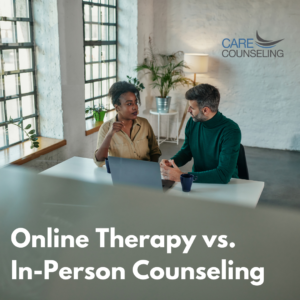Online Therapy vs. In-Person Counseling
 In an age where technology is transforming every aspect of our lives, mental health support is no exception. Online therapy, also known as teletherapy or telehealth counseling, has gained popularity as a convenient and accessible alternative to traditional in-person counseling. But how does it compare to face-to-face sessions? Is one better than the other? In this blog post, we’ll explore the key differences between online therapy and in-person counseling to help you decide what’s right for you.
In an age where technology is transforming every aspect of our lives, mental health support is no exception. Online therapy, also known as teletherapy or telehealth counseling, has gained popularity as a convenient and accessible alternative to traditional in-person counseling. But how does it compare to face-to-face sessions? Is one better than the other? In this blog post, we’ll explore the key differences between online therapy and in-person counseling to help you decide what’s right for you.
Online Therapy: The Digital Alternative
Online therapy involves engaging with a mental health professional through digital platforms such as video calls, phone calls, or text messaging. It offers several advantages that make it an appealing option for many:
- Convenience and Accessibility
One of the most significant advantages of online therapy is convenience. You can access therapy from the comfort of your own home or any location with an internet connection. This eliminates the need for commuting to an office, saving you time and reducing potential stress associated with travel.
- Anonymity and Privacy
Online therapy provides a degree of anonymity and privacy that may make some individuals feel more comfortable opening up about their issues. You can participate from a place where you feel safe and secure, reducing the fear of running into someone you know in the waiting room.
- Flexible Scheduling
Online therapy often offers more flexible scheduling options, making it easier to fit therapy sessions into your busy life. This is particularly beneficial for those with hectic work or school schedules.
- Access to Specialists
Online therapy can connect you with therapists who specialize in specific areas, even if they’re not geographically near you. This expanded access to specialists is a significant advantage for those seeking specialized care.
- Cost-Effective
In some cases, online therapy may be more cost-effective than traditional in-person counseling. You can save money on transportation, and some online therapy platforms offer affordable subscription-based plans.
In-Person Counseling: The Traditional Approach
In-person counseling, on the other hand, is the conventional method of seeking therapy, where you meet with a therapist or counselor face-to-face. Here are some reasons why it might be the right choice for you:
- Personal Connection
In-person therapy allows for a stronger personal connection between you and your therapist. Being physically present in the same room can create a deeper sense of trust and understanding.
- Non-Verbal Cues
Communication is not just about words; it involves body language, facial expressions, and tone of voice. In-person counseling allows therapists to pick up on non-verbal cues, which can be crucial for a comprehensive assessment and treatment.
- Crisis Situations
In-person counseling is typically more suitable for individuals in crisis situations or those at risk of self-harm or harm to others. Immediate, in-person support may be necessary in these cases.
- Structured Environment
In-person therapy sessions often take place in a controlled and structured environment, providing a sense of security and routine. This can be comforting for some individuals.
- Reduced Distractions
Meeting with your therapist in person can reduce distractions that may be present in your home or another online therapy location. This can help you stay focused during your sessions.
Choosing What’s Right for You
The decision between online therapy and in-person counseling ultimately depends on your individual needs and preferences. Here are some factors to consider:
- Comfort Level: Reflect on your comfort level with technology and your desire for face-to-face interaction. Some people thrive in the online therapy setting, while others prefer the intimacy of in-person sessions.
- Severity of Issues: Consider the severity of your mental health concerns. If you’re dealing with a crisis or serious issues, in-person counseling may be the safer choice.
- Access and Location: Your geographical location and access to therapists can also influence your decision. If you live in a remote area with limited access to mental health professionals, online therapy may be your best option.
- Cost: Evaluate your budget and insurance coverage. Some insurance plans may cover both in-person and online therapy, so it’s essential to check your options.
- Therapist Specialization: If you require specialized therapy, research the availability of therapists in your area or online platforms that offer the expertise you need.
- Flexibility: Consider your schedule and how easily you can fit therapy sessions into it. Online therapy may be more accommodating for those with busy lives.
The choice between online therapy and in-person counseling is a highly personal one. Both approaches have their strengths and limitations. The most crucial factor is finding the therapy format that helps you feel comfortable, supported, and understood as you work towards better mental health. Whether you opt for the convenience of online therapy or the personal connection of in-person counseling, seeking help is a courageous and positive step towards improving your well-being. Remember that you have options, and the most important thing is finding the support that works best for you.



























